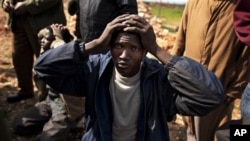Within the first few days of the uprising against Libyan leader Moammar Gadhafi there were reports he had deployed sub-Saharan African mercenaries against the protesters. There is now a growing backlash of violence against sub-Saharan Africans by the opposition. However, it is likely that the number of mercenaries fighting for the besieged Libyan leader is quite small.
It is unclear how many mercenaries Libyan leader Moammar Gadhafi has deployed against Libyan protesters, but African analysts such as Na'eem Jeenah, executive director of the Afro-Middle East Centre in Johannesburg, suggest the number is relatively low.
"It is difficult to say exactly how many mercenaries are operating in Libya and how widespread it is, but I think it is safe to say that they number at least in the hundreds," said Jeenah.
Jeenah and other analysts says Gadhafi has a long history of using mercenaries from Chad, Nigeria, Niger and perhaps even the Central African Republic in other conflicts outside of Libya. Jeenah said some mercenaries were flown into Tripoli in the first few days of the uprising. He says there is an established relationship between Gadhafi and these individuals that would enable such a quick response.
"So in a sense, as much as one can use such a term, there is a kind of relationship that pre-exists," added Jeenah. "And so yes, they can be called up at short notice therefore, called up at short notice, transported in to the country as [some have] been, etc."
But other experts are more skeptical. Issaka Souare, senior researcher at the Institute for Security Studies, says such a rapid reaction by Mr. Gadhafi is questionable.
"The reason why I doubt the thesis is that we started hearing these claims just the third day of the revolt, and I would imagine it would take some time before you really can go and have recourse to these mercenaries, unless you are foreseeing that your own army is not going to be loyal to you," said Souare.
Souare suggests there may be another explanation for the incidents where sub-Saharan Africans are thought to be involved in attacks on protesters.
"So I don't exclude the possibility through migration that some sub-Saharans have integrated, having taken the Libyan nationality, have integrated the Libyan army, or that Gadhafi at some point created a militia formed mainly of these people, and that these are deployed, and then protesters see these, conclude that no they are mercenaries," noted Souare.
Souare added that of the 6.5 million people in Libya, one million are foreign nationals, many of them sub-Saharan Africans. Most are there legally, employed in a range of occupations. Others are undocumented, asylum seekers, or in transit, hoping to travel onwards to countries in Europe.
Afro-Middle East Centre director Jeenah says that if Africans are being recruited by Gadhafi in their home countries, the governments of those countries could be ignoring it.
"A number of African governments as you know received different kinds of funding, or have received, from Gaddafi and so overlooking something like this which for them doesn't pose a big threat to [them], is not something that is farfetched," said Jeenah.
In addition to sub-Saharan Africans willingly fighting for Mr. Gadhafi, experts say reports from Libya suggest that many are unwilling, who have been forced or coerced into bearing arms against the Libyan people.
Experts Disagree on African Mercenaries in Libya




